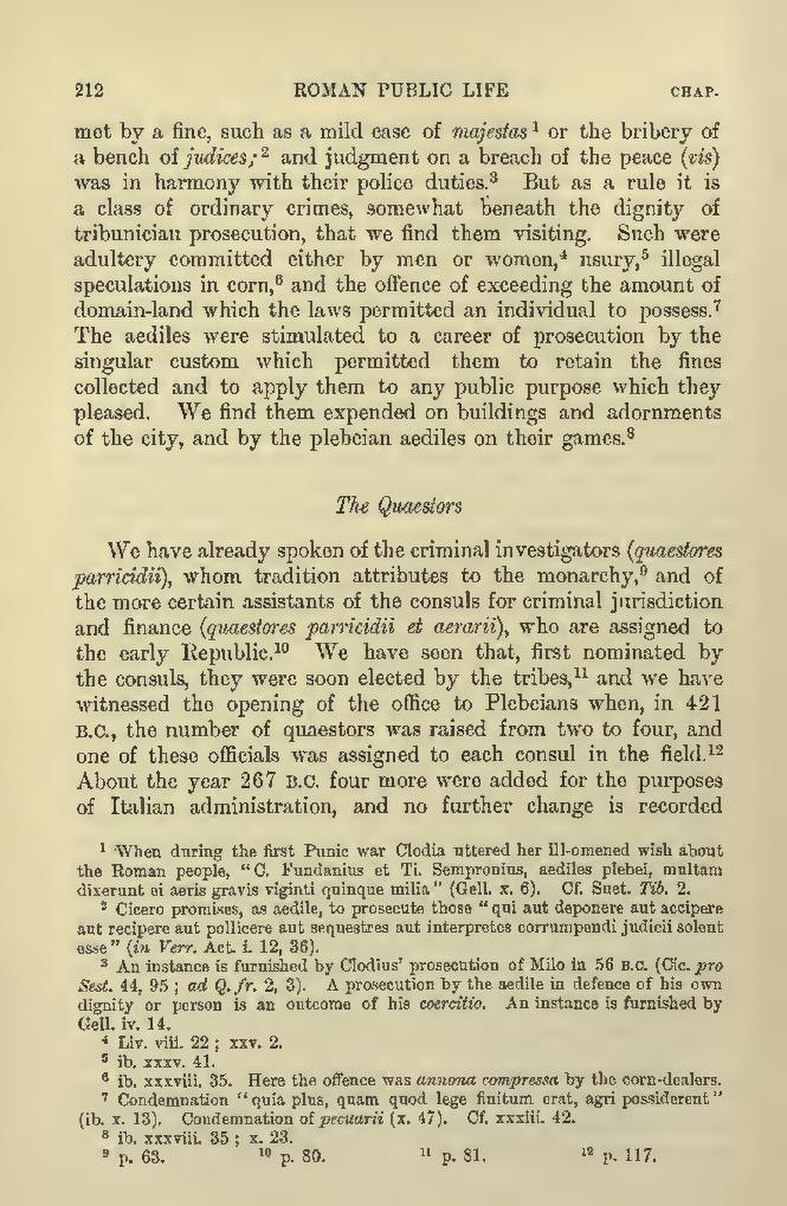met by a fine, such as a mild case of majestas[1] or the bribery of a bench of judices;[2] and judgment on a breach of the peace (vis) was in harmony with their police duties.[3] But as a rule it is a class of ordinary crimes, somewhat beneath the dignity of tribunician prosecution, that we find them visiting. Such were adultery committed either by men or women,[4] usury,[5] illegal speculations in corn,[6] and the offence of exceeding the amount of domain-land which the laws permitted an individual to possess.[7] The aediles were stimulated to a career of prosecution by the singular custom which permitted them to retain the fines collected and to apply them to any public purpose which they pleased. We find them expended on buildings and adornments of the city, and by the plebeian aediles on their games.[8] The Quaestors
We have already spoken of the criminal investigators (quaestores parricidii), whom tradition attributes to the monarchy,[9] and of the more certain assistants of the consuls for criminal jurisdiction and finance (quaestores parricidii et aerarii), who are assigned to the early Republic.[10] We have seen that, first nominated by the consuls, they were soon elected by the tribes,[11] and we have witnessed the opening of the office to Plebeians when, in 421 B.C., the number of quaestors was raised from two to four, and one of these officials was assigned to each consul in the field.[12] About the year 267 B.C. four more were added for the purposes of Italian administration, and no further change is recorded
- ↑ When during the first Punic war Clodia uttered her ill-omened wish about the Roman people, "C. Fundanius et Ti. Sempronius, aediles plebei, multam dixerunt ei aeris gravis viginti quinque milia" (Gell. x. 6). Cf. Suet. Tib. 2.
- ↑ Cicero promises, as aedile, to prosecute those "qui aut deponere aut accipere aut recipere aut pollicere aut sequestres aut interpretes corrumpendi judicii solent esse" (in Verr. Act. i. 12, 36).
- ↑ An instance is furnished by Clodius' prosecution of Milo in 56 B.C. (Cic. pro Sest. 44, 95; ad Q. fr. 2, 3). A prosecution by the aedile in defence of his own dignity or person is an outcome of his coercitio. An instance is furnished by Gell. iv. 14.
- ↑ Liv. viii. 22; xxv. 2.
- ↑ ib. xxxv. 41.
- ↑ ib. xxxviii. 35. Here the offence was annona compressa by the corn-dealers.
- ↑ Condemnation "quia plus, quam quod lege finitum erat, agri possiderent" (ib. x. 13). Condemnation of pecuarii (x. 47). Cf. xxxiii. 42.
- ↑ ib. xxxviii. 35; x. 23.
- ↑ p. 63.
